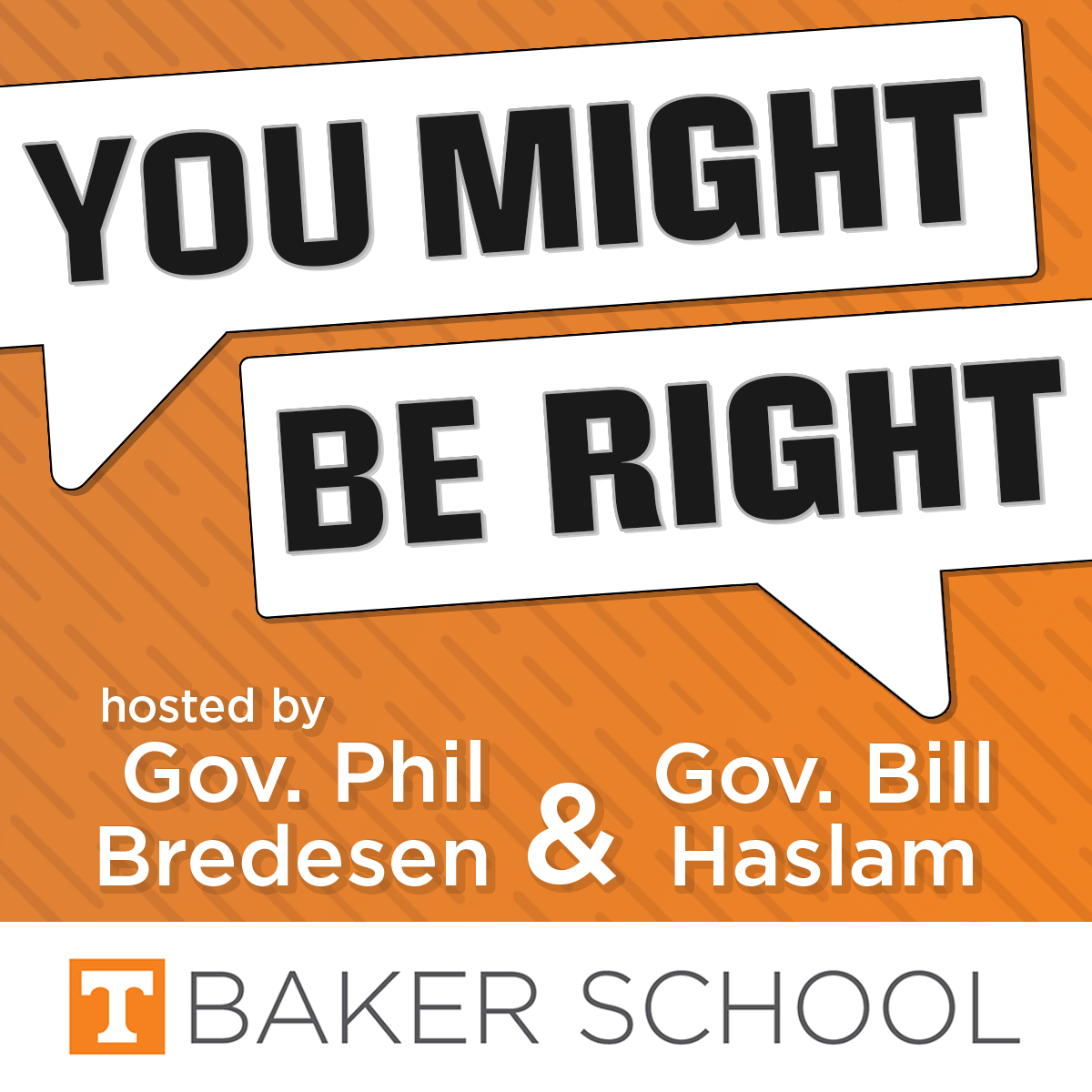Has Pardon Power Gone Too Far?
The power of the US president to pardon convicted criminals is enshrined in the US Constitution, but many experts have harshly criticized the recent use of presidential pardons and calls for reform have grown louder. In this episode, our hosts, former Tennessee Governors Phil Bredesen and Bill Haslam, and their guests, Mike Nelson, professor of political science at Rhodes College, and Steve Vladeck, professor of law at Georgetown University (and returning YMBR guest), discuss presidential pardon power. Why did the Framers adopt the practice of pardoning in the first place? Would their vision of the pardon power line up with the ways it is being used today? And if not, how might the power be reformed to meet the Founders’ intent?
Subscribe and follow You Might be Right wherever you get your audio content – including Apple Podcasts and Spotify – to never miss an episode, or sign up for our email list to receive new episodes straight to your inbox each week here.
“A little bit strange”
Nelson began the conversation by providing historical context for the pardon power clause, noting it is “a leftover from our time as British colonies.” While “there wasn’t a whole lot of debate and discussion about this power at the Constitutional Convention,” Nelson explained, Alexander Hamilton offered two general justifications for it in Federalist No. 78: individual cases of mercy or injustice, and collective situations – such as rebellion – in which the offer of a pardon might help motivate people who had already committed a crime to end their rebellion and go home.
Vladeck added that that part of why the clause “looks a little bit strange” today is because of how much control over federal criminal prosecutions has shifted to the President.
“At the founding, when criminal prosecutions were much more diffuse, when it was possible that you could have not just local US attorneys, but even in some cases maybe private lawyers bringing criminal prosecutions under federal law, the pardon power was actually a really important check,” Vladeck explained. “It was a check on the president’s part to be able to limit abuses by prosecutors and abuses by courts…Now, the only reason why you would issue a pardon if you’re the president is because you’re objecting to what one of your predecessors did…you’re not pardoning to protect against the prosecution that happened under your watch.”
“A terrifying idea in a constitutional democracy”
The discussion turned to different types of presidential pardons that have been in the news – those that are political, personal, and/or preemptive in nature – as well has how pardon power works at the state level, where the process and utilization vary widely.
Both guests agreed that Gerald Ford’s pardon of Richard Nixon was the modern turning point in presidential pardons becoming more political. Vladeck added one other “not so modern” point of comparison, noting that one of the most controversial uses of the pardon power in history – and perhaps the closest example to Donald Trump’s January 6 pardons – was Andrew Johnson pardoning thousands of Confederates following the Civil War. What does distinguish the two, he said, was that Johnson’s use of the pardon power “was really for personal property reasons, not for criminal prosecution purposes.”
As to the legality of preemptive pardons, Vladeck distinguished between two different scenarios. When the crime was the past, but the person hasn’t been indicted yet – such as Ford’s pardon of Nixon – he noted, “the Supreme Court has said that’s okay, albeit in dicta. And I think the general consensus among constitutional law scholars is that’s right.”
The other preemptive scenario – one in in which the crime hasn’t been committed yet, and the pardon is for future conduct – is “where most constitutional scholars, I think, get off the bus…the notion that you can sort of write a forward-looking get out of jail free card is a terrifying idea in a constitutional democracy,” Vladeck said.
“Not easy to do, but it would provide a check”
Both Nelson and Vladeck offered ideas for potential reforms.
“Give both houses of Congress, by a two-thirds vote, the right to override a president’s pardon within a specified period of time,” Nelson suggested. “It’s not easy to do, but it would provide a check, and it would cause presidents to at least anticipate that there might be very embarrassing blowback to actions they might otherwise think they can just do.”
Vladeck offered another reform idea, pointing to a 1925 Supreme Court opinion in which Chief Justice (and former President) William Taft argued that politics served as a check on pardon power – that a president would not pursue a pardon that was politically unpopular.
Noting Taft’s belief has been “increasingly proven too optimistic by our contemporary politics,” Vladeck said that he would be “supportive of a sort of safe harbor period where pardons are not allowed… every four years, have the window between election day and the next inauguration be a pardon-free zone, and I think then you solve some of the lame-duck problems we’ve been talking about as well.”
Subscribe and follow You Might be Right wherever you get your audio content – including Apple Podcasts and Spotify – to never miss an episode, or sign up for our email list to receive new episodes straight to your inbox each week here.

Join the conversation on Twitter by following @UTBakerSchool, @PhilBredesen, and @BillHaslam.


